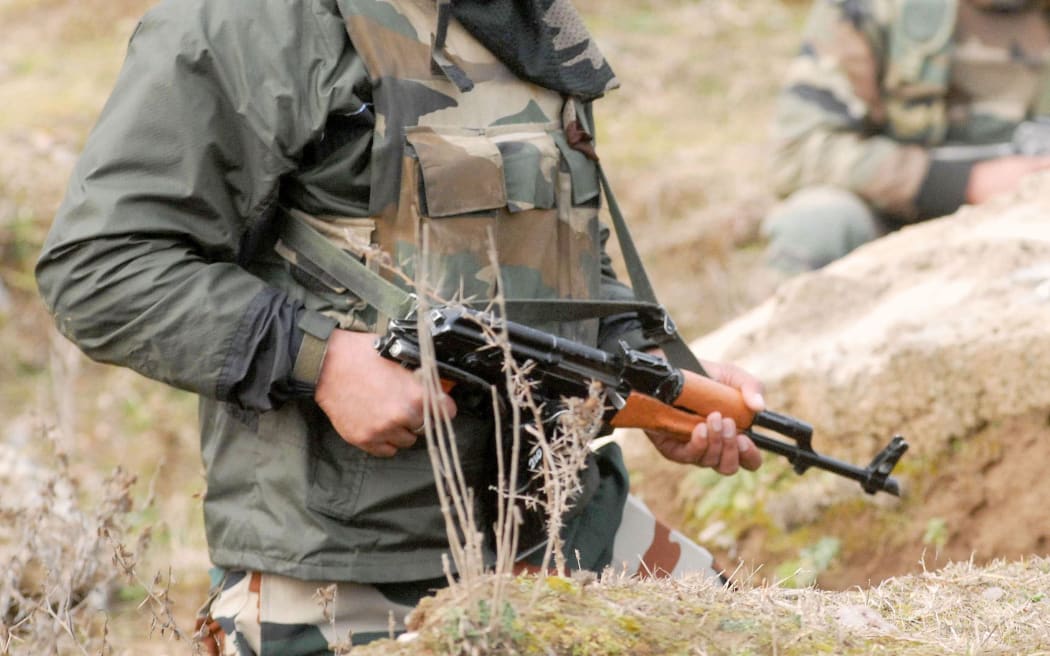At least 17 Indian Army Brigade soldiers have been killed in an attack by militants near the de facto border with Pakistan.

Photo: AFP
Four fidayeen - commando-style gunmen "willing to fight to the death" - were confirmed dead after they broke into the base in Uri near the line of control with Pakistan, an Indian army spokesman said.
An army spokesman confirmed that the number of soldiers killed in the attack had risen to 17, making the toll far worse than a similar raid on an army base in Punjab state in January that India has blamed on Pakistan-based militants.
Television reporters at the scene said the dawn raid had surprised soldiers in their sleep. The attackers set fire to one building before the four were killed in a gunfight that lasted several hours.
The army deployed helicopters to evacuate soldiers who had been injured during the operation to secure the area. The Defence Ministry in New Delhi put the number of wounded at 35.
India home Minister Rajnath Singh said in a series of Twitter posts that he had spoken to the region's political and military leadership and instructed senior officials to monitor the situation.
He cancelled planned trips to Russia and the United States.
"We have activated the entire force in and around Uri sector to step up security and launch combing operations," a senior Home Ministry official told Reuters.
"It is clearly a case of cross-border terror attack. We don't know which militant group is involved," this official added.
There has been no claim of responsibility.
The military death toll was the worst in Indian-ruled Kashmir since a raid in December 2014, also near Uri which is to the west of the region's main city of Srinagar, in which eight soldiers and three police were killed.
The raid comes amid heightened tension in India's only Muslim-majority region, which has faced more than two months of protests following the July 8 killing of a popular separatist commander.
At least 78 civilians were killed and thousands injured in street clashes with the Indian security forces, who have been criticised by human rights groups for using excessive force including shotguns that fire pellets that have blinded people.
India-ruled Kashmir is one of the world's most heavily militarised regions, with hundreds of thousands of soldiers, paramilitaries and police deployed to guard the frontier with Pakistan and contain a restive people with strong leanings towards greater autonomy and even independence.
Before this attack, 102 people had been killed in militant attacks in Indian-ruled Kashmir this year. Among them were 30 security personnel, 71 militants and one civilian, according to a tally by the New Delhi-based South Asia Terrorism Portal.
India accuses Pakistan of supporting militant attacks in its northernmost state, which they both claim in full but rule only in part.
Pakistan denies any role in cross-border terrorism, and has called on the United Nations and the international community to investigate atrocities it alleges have been committed by the security forces in Indian-ruled Kashmir.
The country's foreign ministry said it would be premature to comment on the latest violence.
"At the moment we are just monitoring the situation and it's too early to give a response," Pakistan Foreign ministry spokesman Nafees Zakaria said, adding that it would put out a statement once it had "gathered all the facts".
Indian Prime Minister Narendra Modi recently raised the stakes in the nuclear-armed neighbours' decades-old feud by expressing support for separatists in Pakistan's resource-rich Baluchistan province.
Relations between India and Pakistan have been on edge since the New-Year attack on an Indian air force base in Punjab, near the border with Pakistan, that killed seven uniformed men.
India blamed a Pakistan-based militant group for that attack but, after initial progress, an attempt to conduct a joint investigation has lost momentum. The two sides have frozen a tentative peace dialogue.

